Houston Astros Top Ten Prospects For 2017

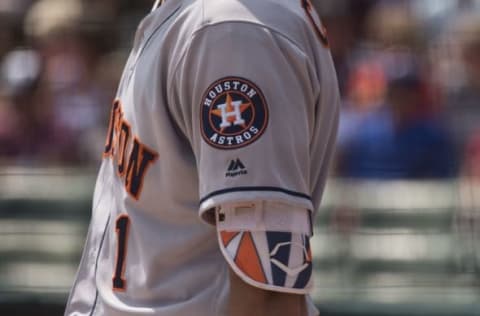
The Houston Astros came back to earth some after a big 2015. What do they have in the pipeline to push back to the elite in 2017?
An Introduction
Our minor league top 10 series is coordinated by Benjamin Chase, one of our contributors at Call To The Pen.
He has poured over thousands of minor league games over the course of the year via milb.tv along with speaking with a number of team and independent scouts. These lists are based out of those conversations.
Each system will have prospects from 10 to 1, and then finish with one newcomer to the system that is worth keeping an eye on that is not in the top 10 at this time.
Conversations are certainly encouraged in the comments section on each system as we go along!
(The Astros) did see the debut of Alex Bregman, their selection at #2 overall in the 2015 draft, along with 11 others over the course of the 2016 season
Astros System Review
The Astros have seen the fruits of six straight losing seasons, three of which were at least 105-loss seasons. Through that time, they accumulated significant draft picks, though the team also developed a reputation as the team that manipulated the draft process through every loophole that the Collective Bargaining Agreement allowed, including backing out on negotiations with Brady Aiken that led to the first unsigned #1 overall selection since Tim Belcher in 1983.
The Astros leveraged their extra draft picks and additional players acquired through compensatory picks to build up a significant farm system, considered one of the 2-3 best in the game for the last 3-4 years, and that is what fueled the team’s rise to the playoffs in 2015.
The Astros did see a fall back to 3rd place in the AL West in 2016 and missed the playoffs, but they did see the debut of Alex Bregman, their selection at #2 overall in the 2015 draft, along with 11 others over the course of the 2016 season, especially in the pitching, where Joseph Musgrove made an impression and Chris Devenski was an important part of the bullpen.
As the Astros continue to build toward the future, they still have one of the top 10 systems in the game, as evidenced by the fact that two of those debuts did not even make the top 10, in spite of arguably being in line to fight for a starting job in 2017 in the major leagues, which says a ton!
Let’s take a look at the top 10!
Next: #10
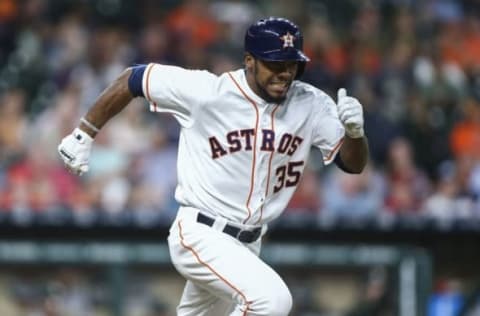
10. Teoscar Hernandez, OF
Birthdate: 10/15/92 (24 years old)
Level(s) Played in 2016: AA, AAA, MLB
Stats in 2016: .307/.377/.459, 10 HR, 34 SB (minor league stats only)
Many teams looked strongly at Hernandez as a Rule 5 draft pick last offseason, however, Hernandez was coming off of a .219/.275/.362 season in AA, and teams chose to stay away.
Now a few teams with they’d have taken that gamble. Hernandez tore up the Texas League for 69 games before moving to the PCL for 38 games and finishing with 41 games at the big league level, finishing just under rookie levels to be eligible for this list.
the big stride that (Hernandez) made in 2016 was in shortening up his swing and being quick to the pitch
Hernandez is an elite athlete for sure, but the big stride that he made in 2016 was in shortening up his swing and being quick to the pitch rather than falling in love with the long ball as he had in the past, which led to heavy strikeout numbers and poor contact rates.
Hernandez has the raw tools that would lead you to think he’d be an elite center fielder, but he struggles with his recognition of the bat off the ball from center and seems to handle corners better. He does have the arm to handle either corner very well.
Hernandez should be able to settle into a 20-home run bat with his raw power, and his speed should allow for 20-30 steals without much worry early on.
He’ll be competing among a few players for the center field for the Astros in 2017, and he could make a lot more teams regret passing him up in the 2015 Rule 5 if he continues the progress he made in 2016 into the 2017 season.
Next: #9
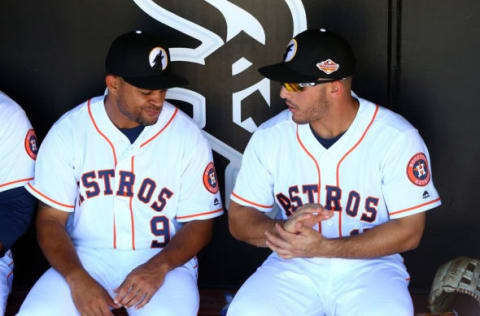
9. Ramon Laureano, OF
Birthdate: 7/15/94 (22 years old)
Level(s) Played in 2016: high A, AA
Stats in 2016: .319/.428/.528, 15 HR, 43 SB
For some reason, under the radar of, well, everyone this year flew Ramon Laureano. He should absolutely be on your radar.
Drafted in the 16th round in 2014, Laureano came with a fairly low profile out of junior college in Oklahoma, but he certainly jumped that profile in 2016 as he led all of full-season minor leaguers in on base percentage.
(Laureano) certainly jumped his profile in 2016 as he led all of full-season minor leaguers in on base percentage.
Laureano has legit defensive instincts at all three defensive positions, and his plus running allows him to track down anything in any position. He doesn’t have a profile right field arm, but he makes his above-average arm play up significantly with his positioning and accuracy.
At the plate, Laureano’s 2016 was absolutely legit. While many may write off the season as products of hitter friendly Cal League and Texas League environments, Laureano showed an excellent ability to control the strike zone and also produce excellent power upon contact.
Laureano has used his elite speed to steal at a 79% success rate in his pro career thus far, though he’s arguably a better base runner than he is a base stealer. He projects to keep stealing as he moves up with solid power.
We’ll likely see Laureano start at AA in 2017, but he could truly factor into the CF competition in spring training with an excellent spring.
Next: #8
8. Daz Cameron, OF
Birthdate: 1/15/97 (19 years old)
Level(s) Played in 2016: short season A, low A
Stats in 2016: .212/.287/.321, 2 HR, 12 SB
If it’s a matter of who has the best raw tools of the high schoolers from the 2015 draft, that’s really not much of a contest – it’d be Cameron.
However, much like his father, that oozing talent struggles to produce consistently on the field. In fact, to this point, he’s struggled to produce at all at the plate.
Cameron profiles as a high-end defensive center fielder
Cameron profiles as a high-end defensive center fielder, as you’d assume from the son of Mike Cameron. However, he also has a strikeout rate akin to that namesake as well, while not hitting near as well.
Cameron’s swing is solid as he uses a quick, short swing that should make easy contact on the ball, and with his speed, he should be able to get plenty of extra singles that others wouldn’t, but he has struggled just to make that contact thus far due to poor pitch recognition.
Cameron is a tremendous natural athlete, and he should add natural power as he fills out his body, but he will need to have consistent contact to get to that power.
Right now, Cameron just has not put it together, but the tools are just so loud that it is hard NOT to have him on this list as I watch him. He has plenty of work to do, but he has the talent to be one of the absolute elite prospects in the whole game the second he puts it together.
Next: #7
7. Franklin Perez, RHP
Birthdate: 12/6/97 (18 years old)
Level(s) Played in 2016: low A
Stats in 2016: 66 2/3 IP, 2.84 ERA, 1.23 WHIP, 6.86 BB%, 27.08 K%
If it weren’t for his baby face, then you’d never guess Perez was just 18 by looking at him. He’s physically mature, standing 6’3 and 200ish pounds with excellent athletic build to his body.
That build likely led to a comfort level in pushing him after he signed as part of the Astros 2014 July 2nd international free agent class. He threw the entire season for low-A, though he did get a late start to the season.
The big stride this season (for Perez) was the consistency with his change
Perez works well with his fastball, and he’s already added a tick to his fastball, seeing it sit 91-94 MPH now and touch 97 with excellent run low in the zone.
His primary off speed pitch is a plus curve ball that has a spin rate that one minor league announcer stated “You can hear from up here in the booth!”
The big stride this season was the consistency with his change. He still struggles with his arm slot consistency as he’s still filling into his body, but the consistency of the feel of the change was notable throughout the year, good or bad delivery.
Perez has the upside of a #2/#3 starter or a back end reliever. His excellent control that he has displayed thus far will allow him to continue progressing as a starter for now.
Next: #6
6. Anibal Sierra, SS
Birthdate: 2/15/94 (22 years old)
Level(s) Played in 2016: rookie
Stats in 2016: .316/.465/.506, 2 HR, 3 SB
While Sierra didn’t have great production in Cuba’s Serie Nacional, he did well on international teams, and when he defected, he had a number of interested teams due to his high offensive ceiling and his present defensive value.
The Astros signed him for $1.5M in July and immediately sent him to their DSL team to get him reps on the year.
The offensive potential was on full display in the DSL
Sierra has very fluid hands and really does not make a mistake when he gets to the ball, using his above-average arm to make plenty of deep plays as well. The concern with Sierra has been his range staying at short, but he’s always showed borderline plus range in international competition.
The offensive potential was on full display in the DSL, though that’s a tough way to measure as he was 22 playing against many guys who were 16-17 years old.
Sierra will need some time to get his feet back under him, but the power potential up the middle is impressive as he could profile as a 20-home run shortstop.
Next: #5
5. Forrest Whitley, RHP
Birthdate: 9/15/97 (19 years old)
Level(s) Played in 2016: rookie
Stats in 2016: 18 2/3 IP, 4.82 ERA, 1.34 WHIP, 7.41 BB%, 32.1 K%
Whitley is a giant of a young man at 6’7 and a listed 240 pounds, though he could be even larger from reports and my views of him. While that means there probably isn’t much physical projection left to Whitley, that’s not exactly a bad thing.
The Astros selected Whitley 17th overall this past June out of high school in Texas, and he only lasted that long after it came out fairly early that he wanted “big money” to sign if he was selected, so once he made it out of the top 10 picks, that “big money” was going to be a stretch for teams.
Whitley uses his size to generate an elite mix of pitches
Whitley uses his size to generate an elite mix of pitches, with a fastball that works from 91-95 and touches 98-99 with some cut action on the pitch as it sits and some sink when he peaks his velocity.
He works with a pair of very solid breaking pitches. His curve is a power curve that blends into his hard slider. At times, it did get difficult to distinguish the two, but both work very well, so that isn’t a bad thing in and of itself, but having that fourth pitch is an asset as he moves up the chain.
His change is a quality pitch, but he doesn’t have the level in confidence to throw it well, and he gets into a bad habit of “aiming” the pitch, which steals its effectiveness.
Whitley will likely see the low-A level by the end of 2017 as long as he can continue to show solid mechanics with his big body, but that is one concern that hadn’t been exhibited but sat in the back of the mind of many I talked with – can he keep his delivery and conditioning?
Next: #4
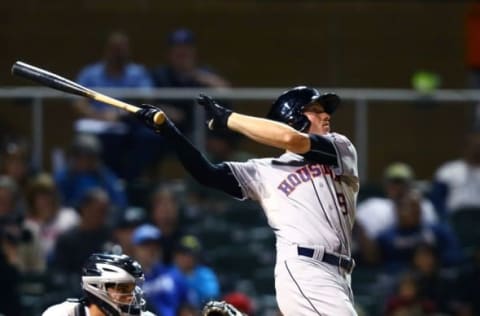
4. Derek Fisher, OF
Birthdate: 8/21/93 (23 years old)
Level(s) Played in 2016: AA, AAA
Stats in 2016: .255/.367/.448, 21 HR, 28 SB
Fisher was the #37 overall selection in the 2014 draft out of Virginia, but it seems as if he’s been in the eye of prospect types for ages due to the high profile of his school and his loud tools coming into the draft.
Few can match Fisher’s power/speed combo, but he seems to be in love with the ball that leaves the park, and his swing has suffered in part as he’s had a high strikeout rate and nowhere near the type of contact you’d expect if you saw his bat speed and the way he keeps the bat head in the zone.
Few can match Fisher’s power/speed combo
Fisher showed that love for the home run in 2016 as he hit a total of 46 extra bases, with 21 of them being home runs, and with the type of swing and speed he has, you would expect that Fisher would tally up plenty of doubles and triples.
Fisher’s speed doesn’t seem to translate to his defense. He’s likely a future left fielder to hide his fringe-average arm, and right now his speed covers up below-average instincts on balls. He would be well served to take tons of fly balls to get that feel for the ball off the bat from his position as he has the speed to be an elite defender in left.
Fisher had a solid 107 at bat introduction to AAA in 2016, and it wouldn’t surprise if he starts there again, but he could be a very valuable trade piece and certainly has the type of tools many teams would covet in a deal as he’s close to the big leagues at this point.
Next: #3
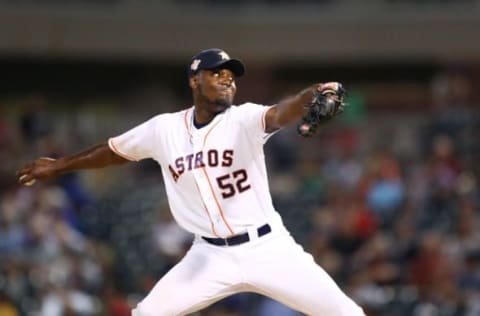
3. David Paulino, RHP
Birthdate: 2/6/94 (22 years old)
Level(s) Played in 2016: rookie, AA, AAA, MLB
Stats in 2016: 90 IP, 2.00 ERA, 1.01 WHIP, 5.28 BB%, 29.44 K% (minor league stats only)
Paulino came into the 2015 season having just missed all of the 2014 season to Tommy John surgery after the Astros astutely got him in the trade for Jose Veras from the Detroit Tigers.
He got back every bit of his velocity in 2015 and showed excellent command right away after taking nearly 18 months off with the surgery and recovery time after having surgery in mid-season 2013. That increased control made many change their idea about Paulino having a limited future as a reliever.
More from Houston Astros
- Julio Rodriguez doing it all for Mariners, including playing peacemaker against Astros
- MLB Trade Deadline: AL West roundup with Rangers, Angels, Astros wishlist, A’s and Mariners for sale
- Grading Dana Brown and the Houston Astros front office at the season’s midway point
- Houston Astros: Houston, we have a Martin Maldonado problem
- Stock Up, Stock Down: Red Sox, Cardinals, Blue Jays and Astros
After never seeing above rookie ball before his surgery, Paulino opened the 2016 season in AA. The Astros handed Paulino a suspension for undisclosed team reasons in June that cost him valuable innings. Overall, if you add in his major league time, Paulino still only accumulated 97 innings in 2016, so his innings will need to be managed again in 2017.
Paulino has a fastball with elite velocity, touching near triple digits and sitting from 92-95 in games I watched in the minors. He gets excellent plane on the pitch from his 6’7 height, working low in the zone with all of his pitches.
His best pitch is very possibly his curve that has excellent depth and actually can have two separate looks – one a more looping curve, and a second a more power curve with less depth but more velocity. He was mistakenly labeled as having a slider, but he has reported that it is simply a different arm speed on his curve.
With his change playing up with his increased control and command, Paulino has essentially a four pitch mix with two plus pitches to lead the arsenal, which would quickly project him as a front line starter type. If he does end up in the bullpen, he’d be among the elite in the game.
Next: #2
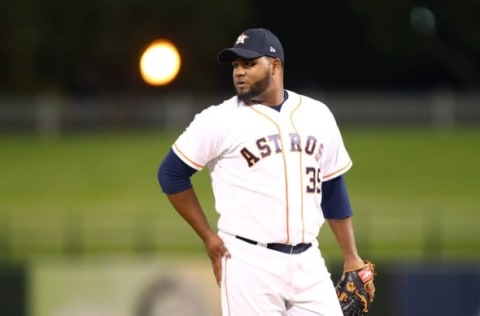
2. Francis Martes, RHP
Birthdate: 11/24/95 (21 years old)
Level(s) Played in 2016: AA
Stats in 2016: 125 1/3 IP, 3.30 ERA, 1.21 WHIP, 8.97 BB%, 25 K%
Martes was another sign of the excellent job the Astros do scouting the lower levels of the minor leagues, when they were able to snag Martes from the Marlins in the Jarred Cosart deal in 2014.
Martes’ signature pitch has been his elite fastball that sits 93-95 while flirting with triple digits. He gets great late movement on the pitch low in the zone, though the pitch does tend to flatten when he gets it up in the zone.
His curve has become an elite power curve, with hard break and high-end velocity for a curve, which throws off hitters that expect a slider at the velocity he throws, but get the depth of a curve.
More from Call to the Pen
- Philadelphia Phillies, ready for a stretch run, bomb St. Louis Cardinals
- Philadelphia Phillies: The 4 players on the franchise’s Mount Rushmore
- Boston Red Sox fans should be upset over Mookie Betts’ comment
- Analyzing the Boston Red Sox trade for Dave Henderson and Spike Owen
- 2023 MLB postseason likely to have a strange look without Yankees, Red Sox, Cardinals
Martes saw his change take a step backward in my viewing this season, and in talking with folks around the game, more and more seem to believe that Martes will be a reliever, whereas the consensus after 2015 was that there was plenty to dream on that Martes could start.
Martes saw his control took a step back as well from plus level in 2015 to above average and even average in 2016, which is another reason some worry about the relief projection.
As a reliever, Martes would be an incredibly elite one, likely immediately one of the absolutely top-level relievers, and he would probably find his way to Houston in short order if he made that move.
Of course, Martes is just 21 this November after pitching in AA all season at 20 years old, so he has time to build on his change and his control.
Next: #1
1. Kyle Tucker, OF
Birthdate: 1/17/97 (19 years old)
Level(s) Played in 2016: low A, high A
Stats in 2016: .285/.360/.438, 9 HR, 32 SB
Tucker’s brother Preston Tucker was a draftee out of college into the Houston system, and roughly a month after he made his major league debut for the big league club in 2015, they drafted Kyle #5 overall as a money-saving maneuver that allowed them to also select Daz Cameron at #37 as well.
Kyle is definitely the more elite athlete of the two brothers, built like a pure athlete at 6’4 and roughly 200 pounds (Preston is 6′ and 215). Kyle is considered to have elite tools across the board, widely considered the best high school hitter in the 2015 draft, and in the argument with Brendan Rodgers as the best overall high school player.
Tucker showed his elite combination of tools as he racked up 25 doubles, 7 triples, and 9 home runs across two levels as a teenager to show his power. He also flashed 32 stolen bases in 44 attempts to display his speed.
Tucker’s best attribute is his contact ability, and he has a very controlled left-handed swing that is able to make consistent contact and keep the bat in the zone for extended time with good power position.
Tucker has a fringe-plus arm, and he’s shown solid instincts in the corners, which could allow him to play at a fringe plus level defensively in right field as he moves forward.
Tucker will likely see AA as a 20 year old in 2017, which is incredible progress for the young outfielder, and there is absolutely reason to consider him among the top 25-50 prospects in the entire game.
Next: Newcomer To Watch
Newcomer To Keep An Eye On: Ronnie Dawson, OF
Birthdate: 5/19/95 (21 years old)
Level(s) Played in 2016: short season A
Stats in 2016: .225/.351/.373, 7 HR, 12 SB
Dawson was one of the best athletes in the 2016 collegiate class, being a former legit football recruit as well as a baseball prospect. While Dawson’s 6’2, 225 pound build would indicate his power, he also has exceptional speed as well.
The Astros plucked Dawson out of Ohio State in the 2nd round in June, and he flashed all the good, bad, and in between in his debut, showing his power, his speed, his willingness to take a walk, but also his contact concerns and his strikeout issues.
As you can see in the video, Dawson has a pretty power swing from the left side, and he can sometimes fall in love with the power swing, making the swing extra long and leading to the swing and miss seen in his game.
Once he gets moving, he is an excellent runner, but he doesn’t have great instincts in the outfield, and his fringe-average arm likely will play best in left field.
Dawson reminds me a lot of Derek Fisher coming out of college with his raw power/speed combo, and the Astros can hope for similar production when Dawson moves to full-season ball in 2017.
Agree? Disagree? Someone you have a question about from the system? Leave a comment down below!